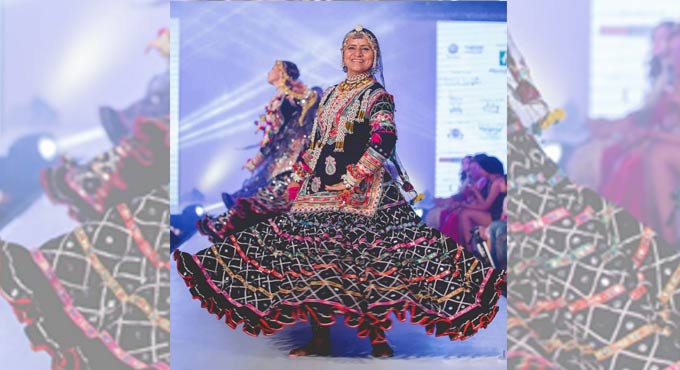Meet Gulabo Sapera, a famous Kalbelia dancer
Gulabo is credited with creating the energetic and graceful Kalbelia dance moves that appear similar to the movements of a serpent.

Kalbelia dancer Gulabo Sapera’s story is one of fortitude and not buckling under societal pressure. A keen proponent of the Sapera dance form of Rajasthan and having toured over 165 countries popularising it, Gulabo received the Padma Shri in 2016. A woman whose story is worth listening to, she was part of the recently-held Jaipur Literature Festival 2021.
Buried alive within minutes of her birth, Gulabo’s unwavering spirit saved her from following a similar fate that often befalls girl child in the nomadic community of kalbelias, an abjectly poor community which lives on the fringes of the society. Their name is derived from their association with snakes – a symbol of ‘kaal’ (death). Her mother, unmindful of her community’s diktats, went into the dark night to save her fourth daughter who was still breathing under the mud after five hours.
“I was born on Dhanteras and my father had gone to the market when I was born. The women who helped in my birthing, went and buried me as they felt I would be a burden to my family which already had three daughters. After my mother saved me, there was a panchayat and my parents were ostracised for not killing me as per the custom of our community. My father stood his ground and said, ‘yeh toh mata hai, hum isko kaise maar sakte hai’,” recalls Gulabo.
Fearful that their baby would be killed at any moment, her father began to carry the six-month-old infant Gulabo in one of his baskets for his shows. “We lived in Kotda village near Ajmer; my father would often visit Jaipur and other nearby cities for his performances. So I grew up watching the snakes, observing them, playing with them… I was never scared,” shares Gulabo.
“Years passed and when I was seven, I was spotted dancing in the Pushkar mela by Tripti Pandey and Himmat Singh, from the Rajasthan Tourism Department. They found my dance bewitching as my movements mimicked that of the snake. They said that it appeared that I didn’t seem to have any bones in my body. I never set out to dance that way; it was just something I had been inspired by. I dance without inhibition. I see the audience as my god and stage is my temple when I perform,” adds Gulabo. The Department offered her the chance to participate in programmes and soon she began to perform on TV shows and from there she got an opportunity to go abroad for tours.
Gulabo is credited with creating the energetic and graceful Kalbelia dance moves that appear similar to the movements of a serpent. She created a special song and a unique black ghagra-choli and dupatta, with multi-coloured piping which has become synonymous with Kalbelia.
Through all this, her family stuck by her, an unyielding pillar of strength that she could fall back on. However, tragedy struck just when a golden opportunity came to her doorstep. When she turned 17 and was just about to leave for the US, as part of a contingent to Washington for the Festival of India, her father passed away. “Again, my community members told me I can’t leave until the 13 days have passed. But I went, knowing that it was my father’s dream — he defied the community for me all his life,” adds Gulabo.
Today, the same community which ostracised her entire family and taunted her husband lauds her and asks her to teach their daughters the dance. “They don’t kill girl children now. And many are studying, have a vocation or are working in good jobs. Now the government also recognises our Kalbelia community,” shares Gulabo who is mother to five children, her eldest daughter is an actor in Rajasthani films and another daughter is in medical school.
Once living in tents on the roadside of Jaipur, today she has a home in the Pink city, France and Denmark. “I go to France and Denmark every three months to teach students the Sapera dance. I have thousands of students; some have even taken on my name ‘sapera’.”
During the pandemic, she helped out other folk artistes who were struggling with rations, going miles into the desert to help them. She is now awaiting the finishing of the construction of her Gulabi Sangeet Sansthan school. “I want a Gulabo in every home, and want to make a Kalbelia gharana to keep its legacy alive alongwith handicrafts made within the community. I don’t want our folk art to die, and want it survive from generation to generation,” signs off Gulabo.
Now you can get handpicked stories from Telangana Today on Telegram everyday. Click the link to subscribe.
Click to follow Telangana Today Facebook page and Twitter .
Related News
-
Amitabh Bachchan reunites with Kamal Haasan for Kalki 2 after four decades
14 mins ago -
India condemns Pakistan strikes as US defends anti-terror operations
20 mins ago -
Chasing dreams, raring to go: Telangana IM Dhruva poised for greatness
8 hours ago -
Patna court refuses transit remand for Andhra police in IPS officer case
8 hours ago -
TTD to deploy advanced lab for laddu prasadam quality
8 hours ago -
Sports Briefs: Sports Shooting Conclave in city
8 hours ago -
India unveils first national counter-terrorism policy ‘Prahaar’
8 hours ago -
Supreme Court refuses plea on Tirumala laddu SIT review
9 hours ago




